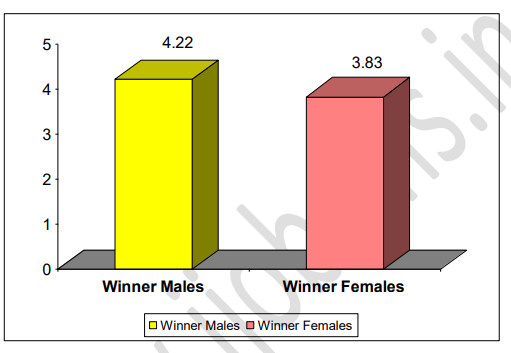A PSYCHOLOGICAL STUDY ON PERFORMANCE OF VOLLEYBALL PLAYERS
Keywords:
Player, Performance, Parameter and Volley.Abstract
The objective of the study was to investigate the psychological parameters and performance of volleyball players. It focuses to assess on psychological variables i.e perception, attention and vigilance of north Indian Zone University level volleyball players. The purposive sampling techniques were used to select the subjects for the study. The first four position holding teams were considered as winner for the collection of data in both gender groups i.e. (male and female). It was concluded that, the male winner group have significant difference on variable perception and attention but in vigilance female group have significant difference than males.
Metrics
References
Arguin, Marlin and Patrick (1988). Parallel processing of two disjunctive targets. Perception and psychophysics. Vol 44(1), pp. 22-30.
Brooks, J.E. Bulls, S.j. (2000). Derogation of student's female athlete who consult a sport psychologist on alternative perspective on the negative halo effect. Journal of winner's science and medicine in sport, Vol 4(1), March, 2001, pp.39-47.
Crabtree Darryl A., and Antrium. (1988) Guidelines for measuring reaction time. Perception and Motor Skills. Vol. 66(2), pp. 363-370.
Francoise DonchampsRiboux, Jean Karl Heinz and Jacques Douchamps (1989). Arousal as tri-dimensional variable: An exploratory study of behavioral changes in rowers following a marathon race. International Journal of sport psychology, Vol. 20, pp. 31-41.
Gould. D. Weiss, M. And Weinberg, R. (1982). Psychological characteristics of successful and non-successful big ten wrestlers. International Journal of Sport Psychology, 13:2.
Hardy J., Hall, C.R> and Carron, A.V. (2003). “Perception of team cohesion and athletes”. Use of Imagery. International Journal of Winners Psychology, 34:151-167.
Hodges, N.J. Franks, I.M. (2000). Attention focusing instructions and coordination bias: implications for learning a novel bimanual task. Human movement science 19(6), 843-867.
Kathleen J. Hiscock, Merrill and Bergstrom, Canada (1988). Factors influencing ocular motility during the performance of cognitive tasks. Canadian Journal of Psychology, Vol. 42(1). 1-23
Lagrue, G. (1995). Smoking and winners (French). Cinesiologie. 34-163, Sept./Oct., pp.185-190.
Singh, M., Kour, R., & Kour, A.,. A collaborative diversified investigation of respective responses of sports person coaches and organizations on criminalization of doping.International Journal of Health Sciences,6(S3), 11295–11310. https://doi.org/10.53730/ijhs.v6nS3.8641
Mandeep Singh., Assessment of Vocational Interests of Pahadi & Bakarwal School Students In Relation To Their Gender. Int J Recent Sci Res. 9(3), pp. 24817-24819. DOI: http://dx.doi.org/10.24327/ijrsr.2018.0903.1731
Naatanen, R. (1985). Stimulus processing: Relations in even-related potentials, magnate encephalogram and regional cerebral blood flow. In M.I. Posner and O.S.M. Marin (eds.) Attention and performance XI (chapter 19). Hillsdale, NJ:Erlbaum.
Nideffer, R.M. (1976a). The inner athlete: Mind plus muscle for winning. New York Growell.
Saini (2018). A study of Anxiety, Winners Achievement Motivation and Vigilance across gender and levels of performance of team athletes in the age group of 17 to 22 years, Unpublished Ph.D. Thesis, Dep't. Of Physical Education P.U. Chandigarh

Downloads
Published
How to Cite
Issue
Section
License
© 2025 International Journal of Behavioral Social and Movement Sciences. All Rights Reserved.
All content published in this journal, including articles, images, and other intellectual property, is protected by copyright law. No part of this publication may be reproduced, distributed, or transmitted in any form or by any means without the prior written permission of the publisher.
For permissions and inquiries, please contact us at: editor@theuniversityacademics.com
License Terms for Publications in International Journal of Behavioral Social and Movement Sciences
By submitting an article to the International Journal of Behavioral Social and Movement Sciences, authors agree to the following terms:
-
License Grant:
-
Authors retain copyright for their work. However, by submitting their work, authors grant the journal a non-exclusive, worldwide, royalty-free license to publish, reproduce, distribute, display, and otherwise use the article in any form and medium (print or digital) in perpetuity.
-
-
Open Access:
-
Articles published in this journal are made freely available to the public under the terms of an open-access license. The journal allows anyone to access, download, copy, distribute, print, search, or link to the full text of the articles.
-
-
Attribution:
-
Authors are required to provide proper citation and attribution to the original article when reusing or referencing content. The attribution should include the author(s), title of the article, journal name, volume, issue, and publication year.
-
-
Reuse of Material:
-
Authors may reuse their published work for non-commercial purposes, including reprinting in other publications or personal websites, provided proper attribution is given to the original publication.
-
-
Creative Commons License:
-
The journal may publish articles under a Creative Commons Attribution 4.0 International License (CC BY 4.0), which allows others to remix, adapt, and build upon the work, even for commercial purposes, as long as they give appropriate credit to the original author(s).
-
-
Peer Review:
-
The submitted article will undergo a thorough peer-review process, and the final decision regarding publication rests with the editorial board of the journal.
-
-
Withdrawal:
-
Once accepted for publication, articles may only be withdrawn with the approval of the editorial board and must not be published elsewhere in any form without prior written consent.
-












